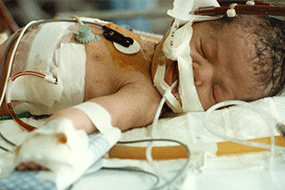Condition
Congenital Diaphragmatic Hernia
What You Need to Know
The diaphragm is a thin sheet of muscle that separates the abdomen from the chest and it helps us breathe. A congenital diaphragmatic hernia (CDH) is a birth defect that causes a hole in the diaphragm during prenatal development. A CDH allows some of the lower abdominal organs to move through the diaphragm into the chest. The presence of abdominal organs in the chest puts pressure on the developing lungs. As a result, the lungs are smaller than normal (pulmonary hypoplasia) and do not function normally (a problem known as pulmonary hypertension).
Key Symptoms
The most common symptoms of a congenital diaphragmatic hernia after your baby is born include:
- Severe difficulty breathing
- Bluish skin from a lack of oxygen
- Rapid breathing and heart rate
Diagnosis
Doctors typically diagnose congenital diaphragmatic hernia by:
- Prenatal ultrasound
- Fetal MRI
- Fetal echocardiogram
- Amniocentesis
Treatment
Treatment typically includes:
- Specialized breathing assistance
- Extracorporeal membrane oxygenation (ECMO)
- Surgery
Schedule an Appointment
Our pediatric specialists provide personalized care for your child’s physical, mental and emotional health needs. Meet our providers and schedule an appointment today.
Frequently Asked Questions
What causes congenital diaphragmatic hernia?
What are the symptoms of congenital diaphragmatic hernia?
How is congenital diaphragmatic hernia diagnosed?
What are the treatments for congenital diaphragmatic hernia?
Meet the Providers Who Treat Congenital Diaphragmatic Hernia
Departments that Treat Congenital Diaphragmatic Hernia

The Zickler Family Prenatal Pediatrics Institute
The Zickler Family Prenatal Pediatrics Institute at Children's National Hospital in Washington, D.C., provides specialized care for babies during pregnancy, delivery and after birth.

Help Kids and Make a Difference
Invest in future cures for some of life's most devastating diseases. Give today to help more children grow up stronger.











